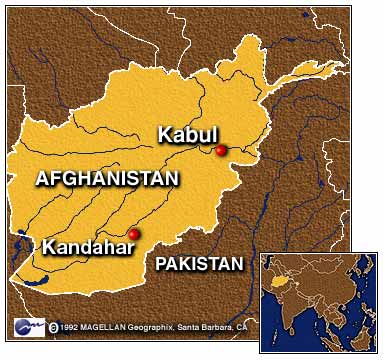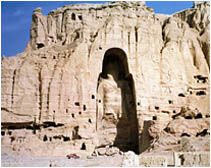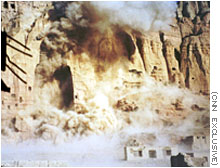 The Taliban
The Taliban
Afghanistan's fundamentalist leaders
John Bowman, CBC News Online | May 2001
Updated July 2001
Source
The Taliban rulers of Afghanistan have drawn the ire of human rights groups and governments around the world with a series of edicts imposed on the Afghan people. Recently, they have decreed that all non-Muslims in Afghanistan must wear identification tags, destroyed two 2,000-year-old statues of Buddha and forbidden women from working, even for United Nations relief agencies.
 The Taliban is a fundamentalist Islamic militia that controls 90 per cent of Afghanistan. Its rise to power effectively ended a 25-year period of civil war, but now Afghanis find themselves under the rule of an austere and puritanical regime.
The Taliban is a fundamentalist Islamic militia that controls 90 per cent of Afghanistan. Its rise to power effectively ended a 25-year period of civil war, but now Afghanis find themselves under the rule of an austere and puritanical regime.
The Taliban – whose name in Arabic means "seekers of truth" – have banned television, dance, film, photography, kite-flying, non-religious music and, most famously, statues such as the giant Buddhas in Bamiyan, which the Taliban destroyed in March 2001.
Under the Taliban's strict interpretation of Islamic law – a controversial interpretation some Islamic scholars call a gross distortion – women cannot work or attend school and must be covered from head to toe when outside of their homes. Since female doctors generally cannot practise and male doctors can not see or touch their female patients' bodies, access to medical care for women is severely restricted.
Only three nations – Pakistan, Saudi Arabia and the United Arab Emirates – recognize the Taliban and their leader, Mullah Mohammed Omar, as the legitimate government of Afghanistan. The United Nations has imposed trade barriers and travel restrictions on Afghanistan. The sanctions are, in part, designed to pressure the Taliban into handing over Osama bin Laden, the accused Saudi terrorist.
 The Taliban first drew the world's attention in 1994, when Pakistan recruited them to protect their trade convoys. They grew in popularity because they fought corruption and lawlessness and because they, like most of the Afghan people, are ethnic Pashtoons, while the leaders at the time were Tajiks and Uzbeks. The Taliban captured the Afghan capital of Kabul in 1996 and, by 1998, had virtually eliminated the opposing northern alliance.
The Taliban first drew the world's attention in 1994, when Pakistan recruited them to protect their trade convoys. They grew in popularity because they fought corruption and lawlessness and because they, like most of the Afghan people, are ethnic Pashtoons, while the leaders at the time were Tajiks and Uzbeks. The Taliban captured the Afghan capital of Kabul in 1996 and, by 1998, had virtually eliminated the opposing northern alliance.
Afghanistan has had a history of civil war and instability since a coup ousted King Zahir Shah in 1973, ending the Durrani Dynasty and the Afghan monarchy. The country was the front line of the Cold War for the latter half of the '70s and the '80s, with Soviet-backed Communists battling the U.S.-backed Mujahedeen, or Muslim holy warriors.


Analysis: Who are the Taleban?
Source
The world first became aware of the Taleban in 1994 when they were appointed by Islamabad to protect a convoy trying to open up a trade route between Pakistan and Central Asia.
Years of conflict have made gun culture the norm in Kabul
The group - comprised of Afghans trained in religious schools in Pakistan along with former Islamic fighters or mujahedin - proved effective bodyguards, driving off other mujahedin groups who attacked and looted the convoy.
They went on to take the nearby city of Kandahar, beginning a remarkable advance which led to their capture of the capital, Kabul, in September 1996.
Anti-corruption
The Taleban's popularity with many Afghans initially surprised the country's warring mujahedin factions.
In spite of military victories the Taleban have yet to achieve the international recognition they crave
As ethnic Pashtuns, a large part of their support came from Afghanistan's Pashtun community, disillusioned with existing ethnic Tajik and Uzbek leaders.
But it was not purely a question of ethnicity. Ordinary Afghans, weary of the prevailing lawlessness in many parts of the country, were often delighted by Taleban successes in stamping out corruption, restoring peace and allowing commerce to flourish again.
Their refusal to deal with the existing warlords whose rivalries had caused so much killing and destruction also earned them respect.
Islamic state
The Taleban said their aim was to set up the world's most pure Islamic state, banning frivolities like television, music and cinema.
Their attempts to eradicate crime have been reinforced by the introduction of Islamic law including public executions and amputations.
A flurry of regulations forbidding girls from going to school and women from working quickly brought them into conflict with the international community.
Such issues, along with restrictions on women's access to health care, have also caused some resentment among ordinary Afghans.
Bin Laden, millionaire with a dangerous grudge
September 12, 2001 Posted: 4:49 PM EDT (2049 GMT)
Osama bin Ladin
(CNN) -- Osama bin Laden, the man intelligence officials say is the prime suspect behind Tuesday's hijacking attacks, is the head of a shadowy organization that is believed to have been targeting the United States and its allies since the early 1990s.
Bin Laden, an Islamic fundamentalist and the son of a Saudi billionaire, has been on the FBI's Ten Most Wanted Fugitive list since 1999, and the U.S. State Department has offered a $5 million reward for his arrest.
U.S. prosecutors say bin Laden is the leader of al Qaeda (Arabic for "the Base"), a worldwide network blamed for both successful and failed strikes on U.S. targets. These include the millennium bombing plot, last year's attack on the USS Cole in Yemen and the nearly simultaneous bombings of the U.S. embassies in Tanzania and Kenya.
Bin Laden's anger with the United States stems from the 1990 decision by Saudi Arabia to allow the U.S. to stage attacks on Iraqi forces in Kuwait and Iraq. After the U.S. victory, the U.S. military presence became permanent.
In a CNN interview with bin Laden in 1997, he said the ongoing U.S. military presence in Saudi Arabia is an "occupation of the land of the holy places."
He left Saudi Arabia in 1991 after feuding with the Saudi monarchy, taking an inheritance worth an estimated $250 million with him.
In 1996, bin Laden issued a "fatwah," a religious ruling urging Muslims to kill U.S. troops in Saudi Arabia and Somalia. A second fatwah in 1998 called for attacks on American civilians.
Network dates back to Afghanistan war
Bin Laden began forming his network in 1979, when he went to Afghanistan to fight the Soviets alongside Afghan resistance fighters known as the mujahedeen.
He used his family's connections and wealth to raise money for the Afghan resistance and provide the mujahedeen with logistical and humanitarian aid, and participated in several battles in the Afghan war.
As the war with the Soviets drew to a close, bin Laden formed al Qaeda, an organization of ex-mujahedeen and other supporters channeling fighters and funds to the Afghan resistance.
Once the Soviets pulled out of Afghanistan, bin Laden returned to Saudi Arabia to work for the family construction firm, the Bin Laden Group. He became involved in Saudi groups opposed to the reigning Saudi monarchy, the Fahd family.
In 1994, the Saudi government stripped him of his citizenship and froze his assets in the country.
Al Qaeda linked to other radical groups
Bin Laden is believed to be at the center of an international coalition of Islamic radicals. Al Qaeda has forged alliances with like-minded fundamentalist groups such as Egypt's Al Jihad, Iran's Hezbollah, Sudan's National Islamic Front, and jihad groups in Yemen, Saudi Arabia, and Somalia, according to the U.S. government. Bin Laden's organization also has ties to the "Islamic Group," led at one time by Sheik Omar Abdel Rahman, the Egyptian cleric serving a life sentence since his 1995 conviction for a thwarted plot to blow up various New York landmarks. Two of Sheik Rahman's sons joined forces with bin Laden in the late 1990s.
The U.S. alleges that from 1992 on, bin Laden and other al Qaeda members targeted U.S. military forces in Saudi Arabia and in Yemen and those stationed in the Horn of Africa, including Somalia.
In October 1993, 18 U.S. servicemen involved in the U.S. humanitarian relief effort in Somalia were killed during an operation in Mogadishu. Their bodies were dragged through the streets.
Bin Laden was indicted in 1996 on charges of training the people involved in the attack and in a 1997 interview with CNN, bin Laden said his followers, together with local Muslims, killed those troops.
U.S. law enforcement also alleges that bin Laden has ties to failed attacks on two hotels in Yemen where U.S. troops stayed en route to Somalia.
On August 7, 1998, eight years after the U.S. deployment in Saudi Arabia, a pair of truck bombs exploded outside the U.S. embassies in Nairobi, Kenya and Dar es Salaam, Tanzania.
Bin Laden has denied responsibility, but prosecutors allege his culpability is evident on faxes sent by his London cell to at least three international media outlets. They also point to incriminating statements by certain alleged embassy bombers who are admitted al Qaeda members.
Fourteen days later, on August 20, 1998, President Bill Clinton ordered cruise missile attacks against suspected terrorist training camps in Afghanistan and a pharmaceutical plant in Khartoum, Sudan.
Bin Laden survived the strikes and was indicted by the U.S. on charges of masterminding the attacks in November, 1998.
Four of his alleged supporters were convicted of the bombings on May 29, 2001, and sentenced to life in prison. Several suspects are in custody awaiting trial.
The man who pleaded guilty to a failed plot to bomb Los Angeles International Airport during the millennium celebrations leading up to New Years Day 2000 claimed he was trained at a camp in Afghanistan run by bin Laden.
Ahmed Ressam said he learned how to handle handguns, machine guns, and rocket-propelled grenade launchers and how to assemble bombs made from the explosives TNT and C4.
Bin Laden is suspected to be living in Afghanistan as a guest of its ruling Taliban government.
Taliban officials have condemned Tuesday's attacks on the U.S. and said that he could not have been involved.
CNN Executive Producer Nancy Peckenham, Producer Phil Hirschkorn, CNN Terrorism Analyst Peter Bergen and CNN.com Writer/Editor Douglas Wood contributed to this report.
Source
September 20, 2001
If Bush Were Serious
About Wiping Out Terrorism
By Derek Bishop
If we want to root out terrorism, then we have to display a leadership that extends beyond our narrow economic and military interests.
We funneled billions in military aid to both Saddam Hussein and Osama bin Laden when it suited US policy to do so. The stark truth of the matter is that these two men are creatures of US policy.
During the waning years of the Cold War we supported Hussein in an effort to contain a Soviet-backed Iran. Reflecting shifting US policy, in the more recent Gulf War we encouraged Iraqi citizens to rise up against Hussein. But as soon as Saddam's army surrendered, and the westward flow of oil from Kuwait was no longer threatened, the war ended. We stood by idly as Hussein slaughtered 1000s of pro-democracy Iraqis. If it was important enough for us to wage war against Iraq, it should have been just as important to install a peace-keeping force to ensure that its nascent democracy took hold. The result is that Hussein, who is a supporter of bin Laden's al-Qaeda terrorist network, is gaining power by the day.
A related issue is the US's shameful medical embargo against Iraq, which has done nothing to hinder Hussein's rule of the area, and has killed 1000s of innocent civilians. Far more have died from our purposeful destruction of the Iraqi water supply, an act violating the Geneva Convention. The UN estimates that 500,00 Iraqi children have perished as a result of US actions and sanctions, with an additional 5,000 dying each month.
Osama bin Laden, another Cold War creation, was supported and trained by the US to repel the Soviet Union's invasion of Afghanistan. Billions of US dollars went to the Afghan Mujahiddeen, a group of Islamic fundamentalist holy warriors. When the Soviets withdrew, the US did nothing to assist the more moderate and tolerant faction within Afghanistan. The result was that the repressive Taliban regime took over. It was not until 1998 that Unocal, under pressure following the US embassy bombings in Africa, pulled out of its Afghan oil pipeline scheme. Earlier this year the US sent $45 million to the Taliban to help fight its production of opium which was a poor decision, given that opium is the Taliban's greatest export, second only to terrorism.
The greatest act of terrorism in modern Middle Eastern history occurred nineteen years ago, in a three-day orgy of rape and murder, when Israel and its Phalangist militia allies killed 1700 Palestinian civilians in the Sabra and Shatila refugee camps. This followed an Israeli invasion of Lebanon that killed nearly 18,000 Lebanese and Palestinians almost all of whom were innocent civilians. The US, of course, backed this act, and provided Israel with the Apache helicopters and Boeing air to ground missiles to get the job done. Israel continues to use US weapons on Palestinian civilians. Israel and US policy are in violation of UN resolutions calling for Israel's withdrawal from Gaza and the West Bank. The US and Britain are the only countries supporting Israel's state sponsored terrorism against the Palestinians.
In my view, there are only two options for the US to pursue. Option 1 is to mount an all-out war on terrorism. This, however, is doomed to failure. Witness Russian military advisers who tell the US that a battle in Afghanistan will make Vietnam look like a picnic. More war will further radicalize an already desperate people, and destablize an already precarious region. More war will not redress, let alone acknowledge, the many wrongs in the Mid East for which the US is responsible. Afghanistan is already laid low. A more wretched country you'll be hard pressed to find.
Option 2 is a non-military option. It involves seeking justice through the International Court, collaboration with international financial institutions to freeze the flow of money that funds terrorism, and a redress, for starters, of Palestinian grievances. The US's blatantly biased support of Israel's war against the Palestinian and Lebanese people has created the fever pitch of anger we now find in radical Islam. After considerable study in this area, I feel that the silver bullet to the resolution of our Mid East problems would be forcing Israel to withdraw to its pre-1967 borders: A complete withdrawal from Gaza, the West Bank, and East Jerusalem. This would be in accord with international consensus, via the UN, that Israel is illegally occupying these lands. If this can be accomplished, much of the basis for the anger that drives terrorism will be removed.
The result of a non-military approach could be miraculous. Let us see what some honesty and a turning of the other cheek might accomplish.
And, if it doesn't work if it doesn't curb terrorism -- then the US could always fall back on its military might, re-installing an Israeli state 1000 miles across if we chose to do so.
Mario Cuomo, New York's governor, has spoken eloquently regarding the horrible events of September 11 as NOT being a Pearl Harbor. It was an act of terrorism, NOT an act of war.
If the US succumbs to its fears, gives up its cherished civil liberties, becomes a more closed society, and refuses to acknowledge that the vast majority of Islam (and there are many denominations of Islam) does NOT support terrorism, the world OUR world will become a yet more sorrowful and fearful place.
Make no mistake about it: The terrorism of September 11 was a horrible, despicable, unconscionable act. But more bloodshed through a US war effort is neither morally nor politically right. CP
Derek Bishop lives in Hawaii.
Source